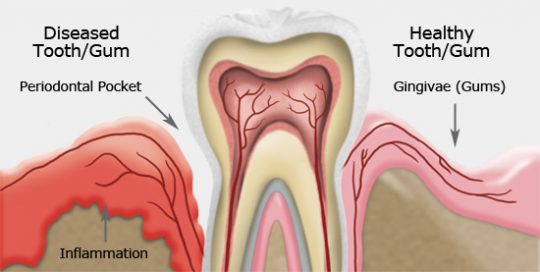
Gum Disease
This is one of the most common form of diseases in the oral cavity. This is also one of the most neglected one as the patient does not have pain.
How do I know that I have Gum Disease?
If you have one or more of the following signs and
symptoms you are probably suffering from
a gum disease:
- Red, swollen and tender gums.
- Bleeding while brushing teeth or flossing.
- Bad breath.
- Pus draining from the gums.
- Bad taste in the mouth.
- Loose teeth.
- Mild pain at times.
- Receding gum line with sometimes sensitive teeth.
What happens to a person with gum disease?

There is an inflammation of the gums which is caused by plaque. Plaque is a soft sticky film that build around the teeth and has millions of bacteria. If the plaque is not promptly removed the gum inflammation worsens and affects the bone surrounding the teeth. The bone gets resorbed due to infection and the tooth becomes loose. If not treated immediately the tooth might be soon lost.
How can the gum disease be treated?
1 Proper brushing and flossing can reverse the very early stages of gum disease.
2 Professional cleaning is done by the Hygienist who removes the hardened plaque which is known as tartar. Tartar built up below the gum is not reachable by the tooth brush.
The Hygienist with special instruments reaches these spots and cleans them.
Professional Dental cleaning is recommended every four to six months. The factors that affect the duration of the cleaning are:
- Amount of tartar present.
- Location of tartar. (Above or below the gums)
- Personal hygiene -Brushing, flossing.
- General health of person.
- Age of person.
- Diet
Other factors that affect gum disease
There are other systemic factors that can affect or contribute to gum disease.
They are:
1 Diabetes
2 Smoking
3 Hormonal fluctuations
4 Nutritional deficiency
5 Puberty
6 Stress
7 Genetics
8 Aging
9 Certain medications
10 Diseases like HIV
How can you prevent?
- By maintaining good oral hygiene.
- By proper brushing and flossing regularly.
- Going for regular check up with the dentist.
- By getting teeth cleaned regularly by dental hygienist .
- By maintaining good overall health.
